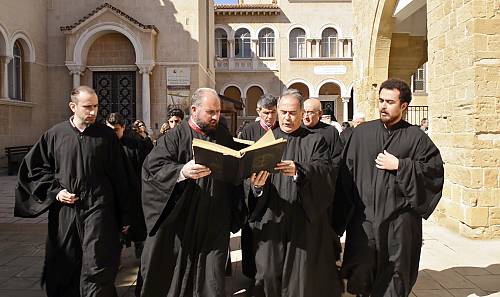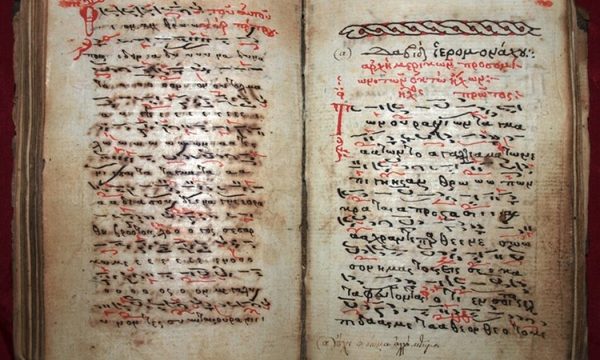UNESCO adds Byzantine Chant to List of Intangible Cultural Heritage
Recognizing the significance of Byzantine Chant as an enduring cultural practice of Cyprus and Greece, UNESCO added Byzantine Chant to its List of Intangible Cultural Heritage in 2019. This inscription took place during the fourteenth session of the Intergovernmental Committee for the Safeguarding of the Intangible Cultural Heritage, which met from December 9–14, 2019, in Bogotá, Colombia.

Byzantine chant is part of a rich cultural tradition spanning over two thousand years. The Medieval Institute reached out to Dr. Angel Nicolaou-Konnari, Professor of History at the Cyprus University of Technology and a leader of the initiative to have the chant added to the list, to speak about her work in advocating on behalf of the practice.
Describing the cultural value of chant, Nicolaou-Konnari explained, “Byzantine chant has a central role in the religious worship and the spiritual and social life of Orthodox Greeks and Orthodox Christians at large. It is inextricably linked with the most important events in a person’s life, such as baptisms, weddings and funerals, as well as with the observance and celebration of religious festivals. Consciously or unconsciously, Byzantine chant accompanies a person throughout his or her life journey at times of happiness and sorrow, amiability and introspection.”
Dr. Alexander Beihammer, Professor of Byzantine History, Medieval Institute Faculty Fellow, recent chair of the Byzantine Studies Program committee, and a resident of Cyprus, provided context on the historical development and preservation of these chants.
According to Beihammer, “Cyprus has a rich local tradition of Byzantine chant with numerous musical manuscripts preserved in the monastic and episcopal libraries of the island and in some private collections. Some of this material reflects the work of local composers and a specific style of local origin. Many manuscripts were brought to Cyprus from other centers of the Greek Orthodox World, such as Constantinople, Moldavia-Wallachia, and regions of Asia Minor.
"In the post-Byzantine period, Byzantine chant in Cyprus incorporated old traditions of Byzantine chant with new influences bringing western elements (through Crete) and Ottoman elements (through Constantinopolitan Ottoman chant, which is in many ways very similar to the Byzantine tradition).”
In other words, these chants contain an amalgamation of tradition that provides a musical pathway through Cypriot cultural movements over the centuries.
 Byzantine Musical Notation. Photo: Orthodox Times
Byzantine Musical Notation. Photo: Orthodox TimesGiven Byzantine chant’s reflection of the region’s history and deep entwinement with both religious and social frameworks in Greek and Cyprus, Nicolaou-Konnari knew its continuation was key: “As a living art of unequaled lyricism and as a comprehensive music system, it constitutes a poignant combination of language and verse, music and rhythm, characteristics that render it a powerful cultural expression and an essential trait of the collective identity of the Orthodox Greeks.”
However, Byzantine chant’s musical and linguistic role takes on an even more vital layer to Nicolaou-Konnari, who notes, “Most importantly, it has maintained the continuity of the Ancient Greek language with Medieval and Modern Greek and with the Greek Cypriot dialect and has significantly influenced folk and popular Greek music.”
Byzantine Chant’s addition to the List of Intangible Cultural Heritage is an important step in preserving this cultural artifact, which faces an uncertain future.
Beihammer explains, “Mostly through oral family traditions (fathers teaching their sons), some of this musical tradition is still alive and cultivated in the churches over the island, although there were some important changes dating back to the 19th century due to a reform movement and in recent decades, many of the representatives of local chant traditions have passed away."
The Convention for the Safeguarding of Intangible Cultural Heritage was drafted by UNESCO in 2003 and adopted in 2006 in order to preserve an inclusive range of intangible cultural practices. Traditions defined as intangible may relate to oral traditions, food culture, social practices, and more. States that are party to the convention commit to safeguarding these traditions, though they can also receive funding from UNESCO to assist with these efforts. Currently, 178 states participate in the convention.
With its long support for both the study of Byzantium and Sacred Music, the Medieval Institute welcomes the decision by the committee to preserve Byzantine Chant.